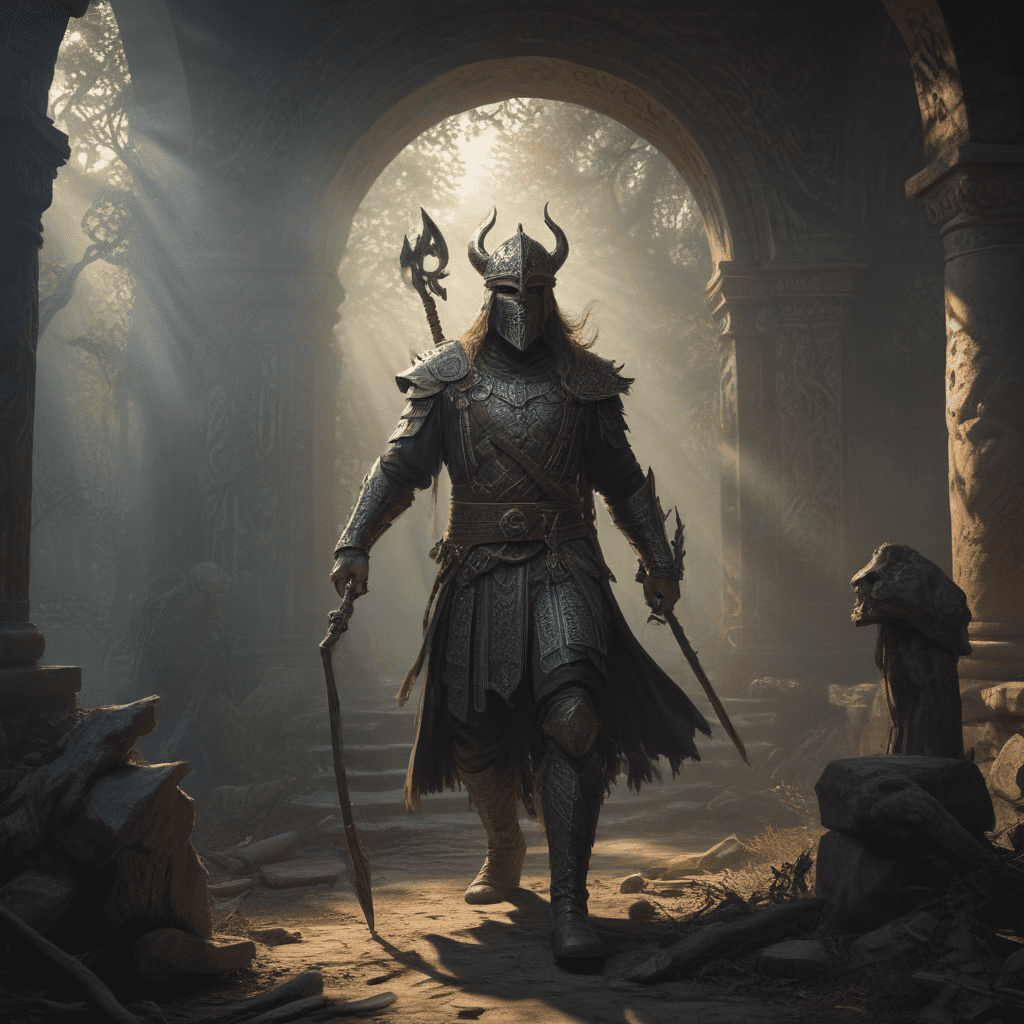Wielding Power: The Fiercest Battles of Mythological Heroes
Introduction: The Allure of Mythological Battles
Throughout history, mythology has served as a cornerstone of human culture, providing not only entertainment but also moral and ethical guidance. The tales of gods, goddesses, and heroic figures encapsulate the struggles, triumphs, and tribulations of humanity itself. Among these narratives, heroic battles stand out as defining moments that shape the fate of entire civilizations and reflect the values of the societies that tell them.
This article aims to delve into iconic battles from various mythological traditions, exploring their significance and implications in both ancient and modern contexts. From the fierce duels of Greek heroes to the grandiose confrontations in Eastern epics, we will uncover the layers of meaning behind these legendary clashes.
Defining the Mythological Hero
Mythological heroes are often characterized by specific traits that elevate them above ordinary mortals. They possess extraordinary strength, courage, intelligence, and often a touch of divine favor. These qualities allow them to confront overwhelming odds and emerge victorious, albeit not without sacrifice.
- Courage: Heroes face their fears head-on, often putting themselves in danger to protect others.
- Strength: Physical prowess is a common trait, enabling them to defeat formidable foes.
- Wisdom: Many heroes are not just brawn; they also possess strategic thinking and knowledge.
- Divine Favor: Often, heroes receive aid from gods or possess unique abilities granted by divine forces.
Prominent mythological heroes include Achilles and Hercules from Greek mythology, Rama and Arjuna from Indian epics, and Beowulf from Anglo-Saxon lore. Each of these figures embodies the traits of heroism while facing unique challenges in their respective narratives.
The Epic Clash: Greek Heroes and Their Legendary Conflicts
Greek mythology is replete with fierce battles that have left an indelible mark on literature and culture. One of the most significant is the Trojan War, which features a legendary duel between Achilles and Hector.
The Trojan War: Achilles vs. Hector
The Trojan War, a decade-long conflict, culminates in a fateful clash between Achilles, the greatest Greek warrior, and Hector, the prince of Troy. Their battle symbolizes the struggle between personal honor and the collective good. Achilles seeks vengeance for the death of his friend Patroclus, while Hector fights to defend his city and family.
Hercules and the Twelve Labors: Trials of Strength and Courage
Another iconic figure is Hercules, who is tasked with completing twelve impossible labors as penance for past deeds. Each labor represents a battle against monstrous adversaries, showcasing Hercules’ strength and resilience. From slaying the Nemean Lion to capturing the Golden Hind, these trials are emblematic of the hero’s journey and the universal struggle against chaos.
The Significance of These Battles in Greek Mythology
These legendary conflicts serve multiple purposes: they highlight the virtues of bravery and sacrifice, provide cautionary tales about pride and wrath, and ultimately reflect the human condition. The battles symbolize the eternal struggle between good and evil, personal desires versus societal obligations, and the quest for glory and redemption.
Norse Legends: The Battle for Asgard
Norse mythology presents its own pantheon of heroes and gods engaged in epic battles, most notably during Ragnarok, the end of the world.
Odin, Thor, and Loki: Dynamics of Power Among the Gods
The relationships among Odin, Thor, and Loki illustrate complex dynamics of power and loyalty. Odin, the all-father, seeks knowledge and foresight, Thor embodies strength and protection, while Loki represents chaos and cunning. Their interactions often lead to both conflict and collaboration in the face of existential threats.
The Final Battle of Ragnarok: Fates of the Gods and Giants
Ragnarok signifies the ultimate confrontation between gods and giants, where destinies are fulfilled and sacrifices are made. The themes of fate, sacrifice, and rebirth permeate this narrative, showcasing the Norse belief in the cyclical nature of existence.
Themes of Destiny and Sacrifice in Norse Mythology
Norse battles resonate with themes of fate and the inevitability of sacrifice, emphasizing that even the mightiest heroes cannot escape their destinies. These narratives reflect a worldview steeped in the acceptance of mortality and the importance of honor in the face of doom.
Eastern Mythologies: Divine Warriors in Epic Confrontations
Turning to Eastern mythologies, we find powerful narratives that revolve around divine warriors and their battles against evil forces.
The Ramayana: Rama vs. Ravana as a Battle of Good vs. Evil
The Ramayana narrates the epic conflict between Rama, the seventh avatar of Vishnu, and Ravana, the ten-headed demon king. This battle signifies the triumph of good over evil, with Rama embodying dharma (righteousness) and Ravana representing adharma (unrighteousness).
The Mahabharata: Arjuna’s Moral Dilemmas in the Kurukshetra War
In the Mahabharata, the Kurukshetra War showcases Arjuna’s moral dilemmas as he grapples with the ethics of fighting against his own kin. This internal conflict highlights the complexities of duty, righteousness, and the consequences of war.
The Role of Divine Intervention in Eastern Battles
Divine intervention plays a significant role in these epic confrontations, with gods and celestial beings influencing the outcomes. The presence of divine forces emphasizes the interconnectedness of the mortal and divine realms in shaping fate.
The Role of Monsters and Adversaries in Heroic Battles
Monsters and adversaries are crucial components of mythological battles, often symbolizing the inner and outer demons that heroes must confront.
- Medusa: Represents fear and the consequences of hubris.
- Grendel: Embodies the darkness and chaos lurking in the human psyche.
These encounters are more than physical battles; they signify the hero’s journey and the struggle against personal fears and societal evils. Notable confrontations, such as Perseus and Medusa or Beowulf and Grendel, highlight the theme of overcoming adversity to achieve personal growth and societal benefit.
Lessons from Mythological Battles: Morality and Ethics
Mythological battles impart essential moral lessons, often reflecting the consequences of power struggles on both individuals and societies.
- Consequences of Hubris: Many heroes face dire consequences due to their pride.
- Importance of Sacrifice: Heroes often must sacrifice personal desires for the greater good.
- Complexity of Morality: These narratives depict morality as a spectrum rather than a binary choice.
These lessons resonate with contemporary issues, emphasizing the need for ethical considerations in leadership and personal conduct.
The Influence of Mythological Battles in Modern Culture
Mythological battles continue to influence modern culture through adaptations in literature, film, and video games.
- Literature: Contemporary novels often draw upon mythological themes to explore human nature.
- Film: Movies like “Troy” and “Clash of the Titans” reimagine ancient battles for new audiences.
- Video Games: Games such as “God of War” incorporate mythological elements, allowing players to engage with these narratives actively.
The persistence of these themes in modern storytelling underscores their universal relevance and the continued fascination with heroism and conflict.
Comparative Analysis: East vs. West in Mythological Battles
East and West offer contrasting themes and styles of heroism, shaped by cultural contexts and philosophical beliefs.
- Heroism in the West: Often focuses on individualism and personal glory.
- Heroism in the East: Emphasizes collective responsibility and moral duty.
This comparative analysis reveals the cultural significance of battles in shaping societal values and moral frameworks, reflecting the diverse ways humanity grapples with conflict and heroism.




